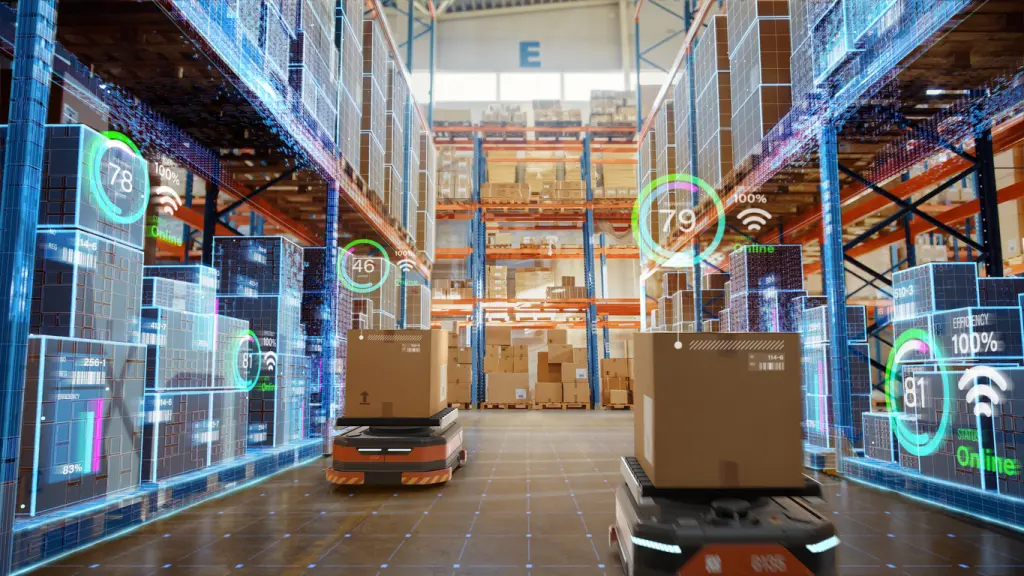The pervasive influence of digital transformation has touched all facets of contemporary business practices, including the supply chain. In order to remain competitive in a rapidly evolving global market, companies are recognizing the necessity of integrating digital technologies into their supply chain management strategies as a vital component for success.
What is a Digital Supply Chain?
A digital supply chain is a modern network of suppliers, manufacturers, distributors, and customers that uses digital technology to improve the flow of goods, information, and finances. This approach differs from traditional supply chain models by integrating digital tools for real-time data exchange, automation, and increased visibility. Technologies such as IoT, AI, cloud computing, and blockchain are key components that enhance agility, responsiveness, and operational efficiency. In today’s competitive business environment, companies are under pressure to cut costs, speed up production, and enhance customer experiences. Traditional supply chains, with their outdated systems and manual processes, struggle to meet these demands. Digital supply chains offer a solution by enabling data-driven decision-making, streamlining operations, and promoting collaboration among stakeholders. Real-world examples of digital supply chains can be seen in companies like Amazon and Walmart, using advanced analytics and IoT sensors for inventory management, and BMW and Tesla, implementing blockchain technology for supply chain transparency.
Are you looking for synchronised integrations to enhance your digital supply chain? Visit our Integrations below to unlock potential for digital supply chain efficacy.
The Evolution of the Supply Chain: From Analog to Digital
Supply chain management has evolved significantly from manual and fragmented processes to a highly integrated and digitally-driven ecosystem. The introduction of digital technologies such as ERP systems, barcoding, and IoT has revolutionised supply chains, leading to improved efficiency, reduced costs, and enhanced customer service. Early adopters of digital transformation have gained a competitive advantage, while those slow to adapt risk falling behind in today’s digital-first landscape.
Core Aspects of the Digital Supply Chain
The digital supply chain consists of various interconnected components, procedures, and technologies that collaborate to enhance the movement of products, data, and funds.
Fundamental Elements
A complex network of interconnected elements, processes, and technologies that work together to optimise the flow of goods, information, and finances encapsulates the digital supply chain. At its core are digital platforms, IoT devices, data analytics tools, and collaboration platforms that enable seamless integration and data exchange. These fundamental elements work together to frame a cohesive digital ecosystem that streamlines operations, enhances visibility, and drives continuous improvement across the supply chain.
Operational Processes
Various technologies are woven into the digital supply chain to optimise operational processes such as demand forecasting, procurement, manufacturing, inventory management, logistics, and order fulfilment. By leveraging big data analytics, machine learning, IoT sensors, and automation, organisations can achieve increased efficiency, responsiveness, and cost savings throughout the supply chain.
See into the future and predict risks to your supply chain with innovative and intuitive Inventory Management Software.
Implementation in Fully-Digital Companies
While many organisations are working towards digital transformation, only a few have achieved fully digital supply chains. Implementing this requires a strategic approach, including assessing current processes, selecting appropriate technologies, integrating systems, fostering a culture of change, and continuous optimisation. Companies like Amazon, Walmart, Apple, and Samsung have successfully implemented digital supply chains, leading to increased efficiency, improved customer experiences, visibility, and cost reduction. Challenges include legacy system integration, data security, and organisational resistance, which can be overcome with effective change management strategies and clear communication.
Technologies Driving Digital Supply Chains
Digital Supply Chains rely on advanced technologies to facilitate smooth integration, instant visibility, and decision-making based on data. These technologies are continuously advancing, expanding the capabilities of supply chain management.
Big Data and Analytics
Data is essential in the digital supply chain, driving decision-making and optimisation. Big data analytics is crucial for transforming supply chain data into actionable insights. Organisations use advanced analytics tools like predictive modelling and machine learning to uncover patterns and trends, empowering them to make data-driven decisions and gain a competitive edge. Applications of big data in supply chain management include demand forecasting, predictive maintenance, route optimisation, and inventory management. Companies like Walmart, Amazon, GE, Ford, and Pfizer leverage big data and analytics to optimise their supply chains, improve efficiency, and enhance customer satisfaction. Overall, integrating big data and analytics into supply chain management leads to improved performance and a stronger competitive position in the market.
Internet of Things (IoT)
The Internet of Things (IoT) has revolutionised digital supply chains by providing enhanced visibility, tracking, and monitoring capabilities through interconnected devices and sensors. IoT devices play a crucial role in capturing real-time data throughout the supply chain, including asset tracking, environmental monitoring, fleet management, and warehouse automation. By utilising IoT technologies, organisations can improve supply chain visibility, address issues proactively, optimise processes, and enhance customer experiences. For example, in the pharmaceutical industry, IoT sensors are used to monitor temperature and humidity levels during drug transportation to ensure product integrity and regulatory compliance.
Artificial Intelligence (AI) and Machine Learning
Artificial Intelligence (AI) and Machine Learning (ML) are transforming supply chain management through intelligent decision-making, predictive analytics, and process automation. These technologies use advanced algorithms and data analysis to identify patterns, make predictions, and optimise supply chain operations. AI and ML applications in the digital supply chain include demand forecasting, predictive maintenance, route optimisation, automated procurement, and automated inventory management. E-commerce giants such as Amazon and Alibaba, are using AI and ML to enhance their logistics networks for faster and more efficient order fulfilment and delivery, gaining a competitive advantage in their respective industries.
Blockchain
Blockchain technology, originally known for its association with cryptocurrencies like Bitcoin, has become increasingly valuable in supply chain management due to its ability to offer transparency, traceability, and security. A blockchain is a decentralised ledger that records transactions across multiple nodes, making the data immutable and secure. In supply chains, blockchain technology can track the movement of goods, promote transparency among partners, automate contracts, and ensure data integrity. Industries such as food, pharmaceuticals, and luxury goods are utilising blockchain to enhance transparency and trust in their supply chains. Large enterprises like Walmart and IBM have implemented blockchain systems to track the origin and journey of products, enabling quick responses to potential issues.
Cloud Computing
Cloud computing is heralding the transformation of digital supply chains by providing organisations with scalable, flexible, and accessible computing resources over the internet. By utilising cloud-based solutions, businesses can streamline their supply chain operations, promote collaboration, and facilitate real-time data exchange. The benefits of cloud computing in supply chain management include scalability, real-time data sharing, cost efficiency, accessibility, and disaster recovery capabilities. Leading cloud service providers offer a variety of supply chain management solutions, enabling companies to enhance agility, responsiveness, and collaboration in their operations. For instance, global logistics firms like DHL and FedEx are using cloud-based platforms to optimise their transportation networks and improve communication with customers and partners.
Ushering in a digitised format for the supply chain can be a daunting task. Let the Intuendi solution be the answer to all your problems.
Digital Supply Chain Management
Successfully managing a digital supply chain involves using a strategic approach, incorporating best practices, utilising specialised software, and implementing strong performance metrics. Adopting effective digital supply chain management strategies is essential for companies to maximise the benefits of their digital transformation initiatives and gain long-term competitive advantages.
Strategies and Best Practices
Developing and implementing a comprehensive digital supply chain strategy is vital for organisations looking to enhance efficiency and maintain a competitive edge. Key practices include integrating all stakeholders, ensuring end-to-end visibility, making data-driven decisions, operating with agility, prioritising sustainability and ethics, and investing in talent development. Companies that have successfully implemented these strategies have seen improvements in operational efficiency, customer satisfaction, and profitability. For instance, Procter & Gamble has utilised digital platforms and data analytics to optimise inventory levels, reduce costs, and improve customer service.
Software Solutions
Organisations rely on specialised software solutions to effectively manage and optimise digital supply chain operations. These solutions streamline processes, enhance collaboration, and provide real-time visibility and analytics. Leading software solutions include Enterprise Resource Planning (ERP) systems, Supply Chain Management (SCM) software, Transportation Management Systems (TMS), Warehouse Management Systems (WMS), Supplier Relationship Management (SRM) software, Inventory Management Systems (IMS), Product Lifecycle Management (PLM) software, and E-commerce platforms. Leveraging these comprehensive software solutions carves a path to achieving a holistic view of their supply chain operations, improving efficiency, and enhancing their ability to respond to changing market conditions.
Key Performance Metrics
Organisations must establish and monitor key performance indicators (KPIs) to measure and optimise the performance of their digital supply chain. Critical KPIs include on-time delivery rate, inventory turnover ratio, cash-to-cash cycle time, perfect order rate, supply chain costs, supply chain cycle time, and customer satisfaction. Through the data gleaned from tracking and analysing these metrics, organisations can drive supply chain excellence, improve customer satisfaction, and gain competitive advantages.
Advantages of Digital Supply Chain Management
Implementing digital technologies and strategies in supply chain management provides numerous benefits for organisations, such as improving efficiency, responsiveness, and competitiveness. Embracing digital supply chain management allows companies to access valuable advantages that support business growth and customer satisfaction.
Greater Transparency and Traceability
The emergence of digital supply chains has brought about a significant advantage in terms of increased transparency and traceability. Traditional supply chain models often struggled to provide visibility into the various stages of production, distribution, and delivery, making it difficult to track goods and identify potential issues. However, with the adoption of digital technologies such as IoT, RFID tracking, and blockchain, supply chain visibility has been revolutionised. These technologies enable real-time monitoring of goods, precise tracking of items, and a decentralised ledger for recording transactions, ensuring transparency and traceability from start to finish. Industries like food and beverage, pharmaceuticals, and luxury goods have especially benefited from this enhanced visibility, allowing for quick tracing of product origin and journey in case of recalls and ultimately fostering trust and accountability among supply chain partners and customers.
Improved Efficiency and Speed
Digital supply chains are more efficient and faster than traditional ones due to automation, real-time data exchange, and advanced analytics. By leveraging these technologies, organisations can streamline processes, optimise operations, and accelerate the flow of goods and information. Automated systems and robotics in warehouses reduce manual labour and errors, while intelligent routing algorithms and real-time traffic data optimise transportation routes. Predictive analytics and demand forecasting tools help organisations anticipate fluctuations in demand and ensure products are available when needed. Digital collaboration platforms and cloud-based solutions facilitate communication and data sharing among supply chain partners, enabling rapid decision-making. This efficiency and speed lead to reduced costs, increased productivity, and improved customer service levels. Companies like Amazon and Alibaba have set industry benchmarks for supply chain efficiency by using cutting-edge technologies and data-driven processes to fulfil orders quickly and accurately.
Better Risk Management
The globalisation and complexity of modern supply chains have increased the risks faced by organisations, with disruptions from natural disasters or geopolitical events leading to production delays and financial losses. Digital supply chains offer advanced risk management tools like real-time visibility and predictive analytics, allowing organisations to monitor goods and assets continuously and quickly respond to potential disruptions. A strong capitalisation of advanced analytics and machine learning equips organisations to proactively identify risks and adjust their strategies to secure alternative sourcing and implement contingency plans. Collaboration tools also enable efficient communication among supply chain partners to minimise disruptions. Industries with complex supply chains, like automotive and electronics manufacturing, are adopting digital technologies to enhance risk management and ensure business continuity.
Challenges in Digital Adoption
Although digital supply chain management offers attractive advantages, organisations frequently encounter obstacles when trying to adopt and execute it. Successfully navigating these challenges necessitates thorough preparation, strategic implementation, and a comprehensive approach to digital modernisation.
System Integration Issues
One of the main obstacles in implementing digital supply chain technologies is the integration of new systems with existing infrastructure and legacy applications. Many organisations have old ERP systems and other proprietary solutions that are deeply ingrained in their operations. Integrating these legacy systems with modern digital platforms, cloud-based solutions, and IoT devices can be a complex and time-consuming process, requiring technical expertise and resources.
Common integration challenges include data formatting issues, incompatible interfaces, and security concerns. Failure to address these challenges can result in siloed data, inefficiencies, and limited visibility across the supply chain. To overcome these obstacles, organisations often seek help from experienced system integrators or IT consultants who specialise in supply chain digitisation. They can offer guidance on selecting the right digital solutions, developing integration architectures, and ensuring a smooth transition to modern systems.
Data Security and Privacy
In today’s interconnected and data-driven digital supply chains, safeguarding sensitive information is crucial. Supply chain data contains confidential details like operations, finances, and customer information, making it a prime target for cyber threats. To protect against malware, DDoS attacks, and unauthorised access, organisations must implement strong cybersecurity measures like firewalls, intrusion detection systems, and multi-factor authentication. With the rise of IoT devices in supply chains, addressing security challenges posed by these devices is essential to prevent hacking and data breaches. Data privacy is also a major concern due to regulations like GDPR and CCPA, requiring organisations to have robust data governance policies in place. Combining technological solutions, policies, employee training, and regular audits can help mitigate these challenges and ensure the security and privacy of digital supply chain operations.
Organisational Change Management
Organisational changes to adopt digital technologies in supply chain processes can be met with resistance, requiring effective change management strategies and a culture of continuous learning. Key strategies include leadership commitment, comprehensive training programs, clear communication, employee involvement, change champions, performance metrics, incremental implementation, and supportive infrastructure. These strategies help manage cultural and operational changes for successful digital supply chain transformation, enhancing adoption and workforce engagement.
Case Studies: Digital Supply Chain in Action
Examining specific case studies in different industries can provide valuable insights into how digital supply chain technologies and strategies have been implemented successfully, leading to improved efficiency and responsiveness in supply chain operations. These examples illustrate the practical benefits and challenges companies have faced in adopting digital transformations.
Delve into our Case Study Archives for a comprehensive look into digitised supply chains.
Manufacturing
The manufacturing sector has embraced digital supply chain technologies to enhance production processes, supplier collaboration, and logistics operations. Siemens, a leader in industrial automation, has implemented a comprehensive digital supply chain strategy using IoT sensors, analytics, and cloud platforms. This transformation has enabled real-time monitoring, predictive maintenance, and improved collaboration with suppliers. Through advantageous use of data analytics and digital twins, Siemens can accurately forecast demand, optimise inventory, and improve operational efficiency. The results have been impressive, with reduced production costs, lower inventory levels, increased on-time deliveries, and enhanced product quality.
Retail and Consumer Goods
The retail and consumer goods industry has embraced digital supply chain technologies to improve customer experiences, manage inventory efficiently, and streamline logistics operations. Unilever, a multinational consumer goods corporation, has excelled in this area by implementing a comprehensive digital supply chain strategy. This includes using IoT sensors and RFID tags to track goods, a centralised data platform for integrated information, and advanced analytics for demand forecasting and route planning. Unilever has seen significant benefits from this digital transformation, including reduced inventory levels, lower transportation costs, improved delivery rates, and enhanced customer experiences leading to increased brand loyalty.
Healthcare and Pharmaceuticals
Novo Nordisk has successfully implemented a digital supply chain transformation using IoT sensors, blockchain technology, and cloud-based platforms to ensure patient safety and product integrity for its diabetes care products. This has resulted in improved quality control, reduced temperature deviations, increased on-time deliveries, and enhanced supply chain visibility. The company’s transparency and traceability measures have also helped combat counterfeit products and build trust among patients and healthcare providers.
Strategic Recommendations for Businesses
To successfully navigate the complexities of digital supply chain transformation, businesses must approach the process strategically and thoughtfully. This involves developing a clear strategy, conducting a thorough assessment, prioritising implementation, selecting the right technologies and partners, fostering a culture of change and continuous learning, implementing robust data governance and security measures, continuously monitoring and optimising, and leveraging industry best practices. These recommendations serve as guidelines to empowering businesses to unlock the full potential of streamlined operations, enhanced visibility, and sustained competitive advantages in the digital-driven landscape.






